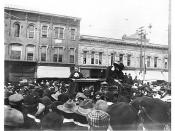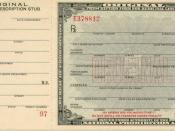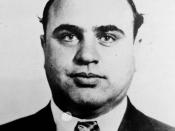Prohibition and Its Failures
Prohibition in the United States was a standard intended to reduce drinking. On January 1919, the 18th Amendment took way the manufacture, transportation, and sale of alcoholic beverages in the United States. The 18th Amendment was backed up by the Volstead Act which defined liquor as ant beverage which contained 0.5% alcohol content or more. Prohibition, the experiment that never really succeeded for many reasons.
Many leaders were very concerned about the drinking behavior of Americans, drinking was a highlight of peoples lives. Prohibition was supported by some big businessmen like John D. Rockefeller, whose arguments were how companies and the economy would improve without alcohol, as their employees would be sober and be able to work more effectively. Leaders of prohibition strongly believed that once the privilege to do business was removed from the liquor trade, the churches and other organizations would like an opportunity to influence Americans to give up alcohol.
These businessmen contributed financially to the campaign, pouring in at least $350,000 to the Ant-Saloon League (ASL) before 1920. The ASL used propaganda like advertisements, magazines, posters, and pamphlets encouraging the public to share heir beliefs. The ASL then pumped in an estimated $75,000 per year thereafter. The big businessmen claimed that alcohol damaged the health of people and that studies showed alcohol caused crime, disorder, poverty and distress. Since the problem was that 75% of the United States population was urban states, prohibition never got any support and was never even introduced in Maryland. The majority of the country enjoyed drinking and did not wish to be told what to do by the government.
Now the people had to devise plans to obtain beer. Prohibition meant the rise in crime and the emergence of gangsters. Bootleggers smuggled liquor from overseas and Canada,



Not bad, covers some good point but...
There are a few spellning mistakes in this essay, also a couple of sections which don't make a lot of sense, so I reccomend re-wirting areas. It covers the main areas connected to the downfall of prohibition in america, and looks at how it did the opposite of what it hoped. It discusses how it fuled both organised and common crime and also how corrupt america was at the time - from polics officer to judge. Good use of relevant dates and statistics. Also, for the English of us out there, don't forget to change localised spellings.
3 out of 3 people found this comment useful.